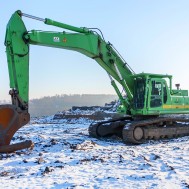Gaskets and o-ring seals are vital components for hydraulic application success. Without these components, high-pressure systems would be impossible.
Determining the correct seal, material and durability needed ultimately depends on the specific application at hand. Since each hydraulic application requires certain sealing characteristics, like permeability to gases or chemical resistance, choosing the proper seal is important. Here’s why:
There are many opportunities for seal failure.
When placed under harsh conditions, seals that are not compatible with their environment will fail. To avoid this, the seal must be able to fully withstand the heat or chemicals that are used in the application and be free from contamination.
Heat erosion occurs when a seal is exposed to high heat over an extended period of time. When this happens, the seal can become brittle or melt, causing a shortened lifespan. In order to increase the seal’s lifespan, it is important to consistently check for cracking in high-temperature hydraulic applications.
Chemical erosion is similar to heat erosion, in that exposure to harsh chemicals over time can cause erosion in less durable materials. When the wrong material is chosen, it may not be compatible with the chemicals used. This can lead to a chemical attack on the seal by oil additives, hydrolysis or oxidation-reduction of seal elements.
Contamination through dirt and debris can have a large impact on seal functionality. Contamination can lead to internal leakage and lowered efficiency in hydraulic pumps, motors and cylinders. Valves could also lose the ability to control flow and pressure within the system.
Choosing the right material is crucial for specific applications.
There are many determining factors to consider when choosing the best fitting seal for a hydraulic system. Many applications require specific seal characteristics that fit with the application description, like fluid pressure range, the temperature range of the application, the type of fluid being used, dimensions of the hydraulic machine and the size you need.
Apple Rubber offers a wide range of materials that work to fit specific hydraulic applications, including:
- Nitrile: Combines excellent resistance to petroleum-based oils, silicone greases, hydraulic fluids, water and alcohols. Nitrile has high tensile strength and high abrasion resistance.
- Ethylene Propylene: Has excellent ozone and chemical resistance. Works well with water, steam break fluids and alcohols.
- Fluorocarbon (Viton™): Works great in a variety of hydraulic applications, including automotive, chemical processing and aircraft fuel systems.
- Neoprene: Functions well in refrigeration units of air conditioning systems.
- Polyurethane: Excellent abrasion resistance and tensile strength. Ideal for seals used under hydraulic pressure and applications where a seal would be subject to wear.
Since each hydraulic application uses different chemicals, temperature and pressure, it is important that the right type of seal and material is chosen to avoid seal failure and any catastrophic system failures.
Want to talk more about hydraulic seals?
Tweet us @AppleRubber to continue the conversation.
